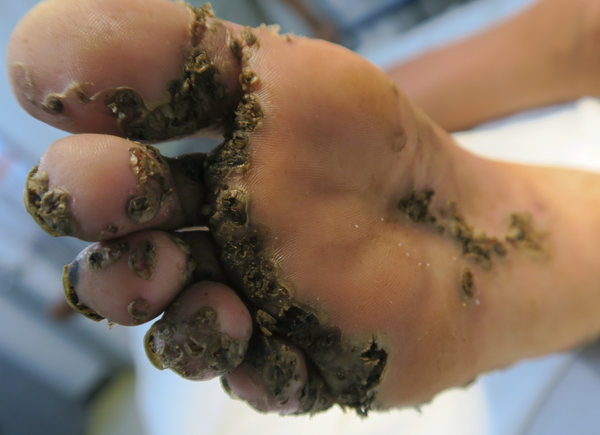By Gladys Fred Kole
South Sudan National Ministry of Health has declared an outbreak of Tungiasis in Lobone Payam of Magwi County, Eastern Equatoria State.
Tungiasis, commonly known as jiggers, is a parasitic skin infection due to infestation with the adult female sand flea, Tunga penetrans.
The larvae and pupae develop in dry, shaded soils, mostly inside the sleeping rooms of houses with an unsealed earthen floor, where most transmission occurs.
In a statement issued by the health ministry yesterday, a total of 78 cases of patients, including 48 males (62%), and 31 females (48%), were recorded.
“The age group 1–10 years had the highest recorded infestation, with tunga penetrans (41%), followed by the age group 50–59 years (12.8%), with teenagers contributing 3.8%. It should, however, be noted that due to the limited investigation period, the number of cases recorded here only represents a small proportion of the community investigated.” The health ministry statement noted
According to the report, in August 2023, an alert of Tunga penetrans infestation was received from Magwi and Ikotos Counties, Eastern Equatoria State, by FBZ, a national NGO operating in the area.
The two counties share borders with Katire in Ikotos and Lobone Payam in Magwi County, and they also share borders with Uganda from the south.
On September 4–8, 2023, the Eastern Equatoria state ministry of health, with support from the World Health Organization (WHO), implementing partners, and the South Sudan Rehabilitation Commission, led a multi-sectoral task force to Lobone Payam, Iswore, Lomarati, and Gara villages to investigate the reported alert of jigger infestation, which was confirmed.
Therefore, in order to mobilize the necessary resources to control and prevent the spread of the disease, the National Ministry of Health has placed these measures:
First, intensify awareness among affected communities about the early symptoms and signs of Tungiasis and promote early health-seeking behavior for treatment of the disease using available treatment options.
Second, promote the wearing of closed-toe shoes, socks that cover your ankles, and long pants when traveling to an area where Tungiasis is prevalent.”
Third, avoid going barefoot in areas infested with Tunga penetrans carrying fleas. And practice health and hygiene education among the population in the affected communities.
The Ministry of Health also encourages improved housing conditions by having properly mudded floors to stop the breeding of fleas.
The public is further urged to be vigilant and report all suspected Tungiasis cases to the national outbreak hotline (666) or the nearest health facility, county health department, and/or state ministry of health.
The negative impacts of Tungiasis are real; the disease can cause immense pain and itching, which disturbs sleep and concentration at school or work. Patients with large numbers of embedded fleas have difficulty walking, often with loss of nails and disfigured and mutilated feet.
The Health Ministry notes that people with Tungiasis experience stigma, social exclusion, and a low quality of life, adding that children with Tungiasis have cognitive impairment and lower school exam scores.
“Impaired physical fitness of adult household members could have a negative impact on household economics. Bacterial superinfection may cause life-threatening complications such as septicemia, tetanus, or gangrene.” Health authorities further explained.
However, South Sudan, like other countries in the region, has not established a formal surveillance system for Tungiasis, and hence there is no data available to monitor trends and drive policy actions.




